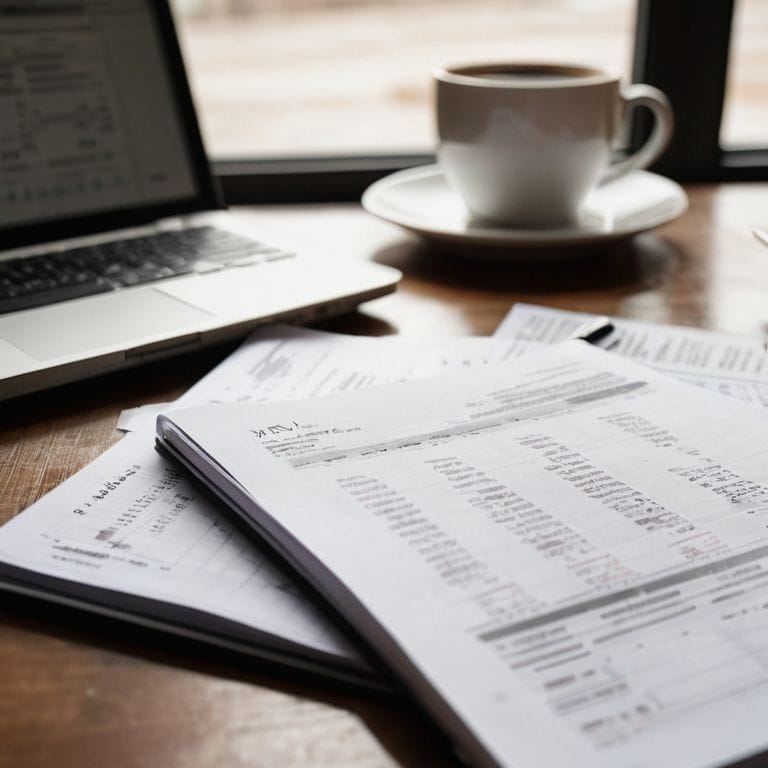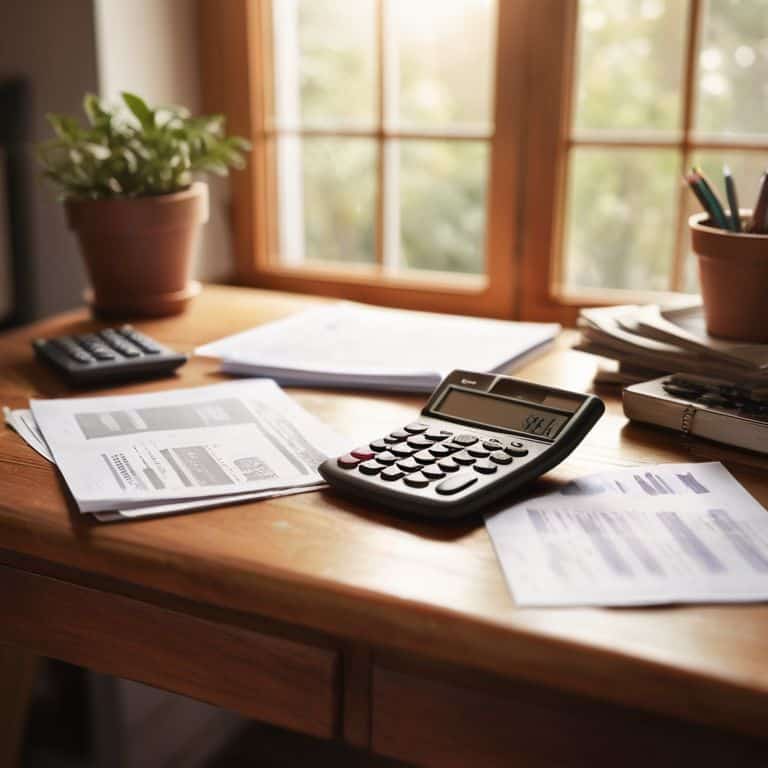I still remember the feeling of being overwhelmed by debt, and the frustration of trying to stick to a budget that just didn’t seem to work. The common advice to simply “cut back on expenses” or “make more money” didn’t cut it for me, and I’m willing to bet it hasn’t worked for you either. The truth is, learning how to stick to your budget is not just about math, it’s about creating a system that actually works with your lifestyle, not against it. I’ve been in your shoes, and I’ve learned that it’s the small, practical habits that make all the difference.
In this article, I’ll share my personal story of getting out of debt and building wealth, and provide you with honest, no-hype advice on how to create a budget that you can actually stick to. You’ll learn how to identify and automate your savings, how to prioritize your expenses, and how to make small changes that add up to big results over time. My goal is to give you a clear, step-by-step roadmap to financial freedom, and to show you that learning how to stick to your budget is not just possible, but achievable, no matter where you’re starting from.
Table of Contents
Guide Overview: What You'll Need

Total Time: 1 hour 30 minutes
Estimated Cost: $0 – $10
Difficulty Level: Easy
Tools Required
- Pencil (for tracking expenses)
- Calculator (for budget calculations)
- Computer (for online budgeting tools)
Supplies & Materials
- Notebook (for writing down expenses)
- Envelope (for cash budgeting system)
- Budgeting App Subscription (optional)
Step-by-Step Instructions
- 1. First, let’s get real about our spending habits. We need to track every single transaction, no matter how small, to understand where our money is going. I use a simple spreadsheet to log my daily expenses, and I recommend you do the same. It’s not about being perfect; it’s about being aware of your spending patterns.
- 2. Next, we need to categorize our expenses into needs and wants. This will help us prioritize our spending and make adjustments as needed. I like to use the 50/30/20 rule: 50% of my income goes towards necessary expenses like rent and utilities, 30% towards discretionary spending, and 20% towards saving and debt repayment. It’s not a hard and fast rule, but it’s a good starting point to rebalance your finances.
- 3. Now, let’s talk about automating our finances. I’m a big fan of setting up automatic transfers for my savings and bill payments. This way, I ensure that I’m saving a fixed amount regularly and never miss a payment. You can also use apps like Mint or You Need a Budget (YNAB) to streamline your financial management.
- 4. The next step is to review and adjust our budget regularly. I like to schedule a weekly money date with myself to review my expenses, check my progress, and make adjustments as needed. This helps me stay on track and avoid unnecessary expenses. It’s also a good time to reflect on my financial goals and make sure I’m moving in the right direction.
- 5. Another crucial step is to find ways to reduce unnecessary expenses. I’m always on the lookout for cheaper alternatives to my subscriptions and services. For example, I switched to a lower-cost phone plan and cancelled my gym membership in favor of free online workouts. It’s all about optimizing your spending to allocate more funds towards your goals.
- 6. Now, let’s talk about accountability. Sharing your financial goals with a trusted friend or family member can be a great way to stay motivated and on track. I also like to track my progress using a budgeting spreadsheet, which helps me see how far I’ve come and what I still need to work on. It’s a great way to stay accountable and celebrate your successes.
- 7. Finally, it’s essential to be patient and persistent. Sticking to a budget is a long-term game, and it’s not always easy. There will be setbacks and unexpected expenses, but it’s how we respond to them that matters. I like to focus on the process, not just the end goal, and celebrate my small wins along the way. It’s all about building sustainable habits that will help you achieve financial freedom in the long run.
Stick to Your Budget

As I continued on my financial journey, I realized that effective expense tracking was crucial to maintaining my monthly budget. I made it a habit to regularly review my expenses, categorize them, and identify areas where I could cut back. This simple practice helped me avoid financial stress and make adjustments as needed. By doing so, I was able to make informed decisions about my spending and stay on track with my financial goals.
One of the most significant challenges I faced was avoiding the temptation to overspend. To overcome this, I implemented budget friendly lifestyle changes, such as cooking at home instead of eating out and finding free entertainment options. I also made use of monthly budget templates to help me stay organized and focused on my financial objectives. By making these small changes, I was able to maintain financial discipline and continue to make progress towards my goals.
As I look back on my journey, I realize that the key to my success was finding a system that worked for me and sticking to it. For budgeting for beginners, I recommend starting small and being consistent. Don’t be too hard on yourself if you slip up – simply acknowledge the setback and get back on track. By doing so, you’ll be well on your way to maintaining financial discipline and achieving financial freedom.
Budgeting for Beginners Made Easy
When I first started budgeting, I felt overwhelmed by all the complicated spreadsheets and financial jargon. But I soon realized that budgeting doesn’t have to be rocket science. For beginners, it’s essential to keep things simple. I started by tracking my income and expenses in a basic notebook, which helped me identify areas where I could cut back. From there, I gradually moved on to using a budgeting app, which made it easier to categorize my spending and set financial goals.
The key is to find a system that works for you and stick to it. Don’t be too hard on yourself if you make mistakes – it’s all part of the learning process. I still remember the early days when I would forget to log certain expenses or overspend on unnecessary items. But with time and practice, budgeting became second nature to me.
Effective Expense Tracking Secrets
To effectively track my expenses, I use a simple spreadsheet that categorizes my spending into needs and wants. This helps me identify areas where I can cut back and make adjustments. I also automate my expense tracking by linking my credit card and bank accounts to my spreadsheet, making it easy to stay on top of my finances.
By doing this, I’ve been able to pinpoint unnecessary expenses and make conscious decisions about how I spend my money. It’s amazing how much of a difference this small habit has made in my financial journey, and I’m confident it can do the same for you.
Sticking to Your Budget: 5 Game-Changing Tips
- Set Realistic Targets: Don’t try to cut back too much too soon, start with small, achievable changes to your spending habits
- Automate Your Savings: Use tools and apps to automatically transfer a portion of your income into savings or investment accounts
- Track Your Expenses: Keep a record of everything you spend money on for a month to identify areas where you can cut back
- Use the 50/30/20 Rule: Allocate 50% of your income towards necessities, 30% towards discretionary spending, and 20% towards saving and debt repayment
- Review and Adjust Regularly: Schedule regular ‘money dates’ to review your budget, track your progress, and make adjustments as needed to stay on track
Key Takeaways to Boost Your Budgeting Success
Set realistic financial goals and track your expenses regularly to identify areas for improvement
Automate your savings and bill payments to make sticking to your budget easier and less prone to error
Schedule a weekly ‘money date’ to review your finances, make adjustments as needed, and stay motivated on your path to financial freedom
Sticking to Your Budget: A Matter of Habit
The key to sticking to your budget isn’t about being perfect, it’s about being consistent – showing up every week, tracking every expense, and making adjustments as you go, because that’s where the real power to change your financial future lies.
Alex Barnes
Sticking to Your Budget: The Path to Financial Freedom

As we’ve discussed, sticking to your budget requires a combination of discipline, patience, and the right tools. We’ve covered the importance of effective expense tracking, creating a budget that works for you, and making adjustments as needed. By following these steps and staying committed, you’ll be well on your way to achieving financial stability and reducing stress. Remember, it’s all about making progress, not perfection, and being kind to yourself when you encounter setbacks.
So, as you embark on this journey to financial freedom, keep in mind that small steps today can lead to significant gains tomorrow. Don’t be too hard on yourself if you slip up – instead, learn from your mistakes and move forward. With time and practice, you’ll find that sticking to your budget becomes second nature, and you’ll be amazed at the sense of accomplishment and peace of mind that comes with it. Stay the course, and you’ll be on your way to a brighter financial future.
Frequently Asked Questions
What are some common pitfalls to avoid when creating a budget that actually works?
Honestly, I’ve fallen into a few traps myself. Common pitfalls include underestimating expenses, not accounting for irregular costs, and being too rigid with your budget. I’ve learned to prioritize flexibility and regularly review my budget to make adjustments as needed. This helps me stay on track and avoid feeling overwhelmed by unexpected expenses.
How can I prioritize my expenses to ensure I'm allocating my money effectively?
For me, prioritizing expenses starts with the 50/30/20 rule: 50% for necessities, 30% for discretionary spending, and 20% for saving and debt repayment. I also review my expenses weekly to ensure I’m on track and make adjustments as needed. It’s all about finding a balance that works for you and sticking to it.
What tools or apps can I use to make tracking my expenses and staying on budget easier and less time-consuming?
I swear by my trusty spreadsheet, but I also recommend apps like Mint, You Need a Budget (YNAB), or Personal Capital. They connect to your accounts, categorize expenses, and offer budgeting tips. I’ve tried them all, and they’re total game-changers for streamlining expense tracking and staying on top of your finances.














